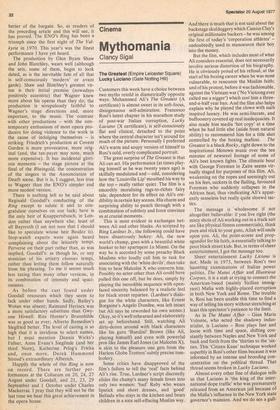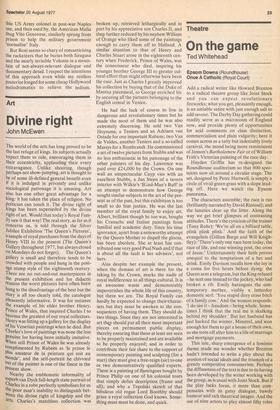Cinema
Mythomania
Clancy Sigal
The Greatest (Empire Leicester Square) Lucky Luciano (Gate Notting Hill) Customers this week have a choice between two myths retold in diametrically opposite ways. Muhammed Ali's The Greatest (A certificate) is almost sweet in its soft-focus, disingenuous self-admiration. Francesco Rosi's latest chapter in his marathon study of post-war Italian corruption, Lucky Luciano (X certificate), is self-consciously flat and clinical, detached to the point where the central character isn't around for much of the picture. Personally I preferred Ali's warm and soupy version of himself to Rosi's cold, overly complicated portrait.
The great surprise of The Greatest is that Ali can act. His performance (at times playing himself as he was twenty years ago) is skilfully modulated and — odd, considering how the 'Louisville Lip' mouthed his way to the top — really rather quiet. The film is a smoothly moralising rags-to-riches fairy tale, dependent for its effect on Ali's credibility in certain key scenes. His charm and surprising ability to punch through with a combination of subtlety and force convince us at crucial moments.
This is most evident in exchanges between Ali and other blacks. As scripted by Ring Lardner Jr., the following could have been disastrously hokey: Ali, the new world's champ, goes with a beautiful white hooker to her apartn?ent in Miami. On the way he is accosted by some preachy Black Muslims who loudly call him to task for associating with the 'white devils', then take him to hear Malcolm X who converts him. Possibly no actor other than Ali could have pulled this one off, but he does, simply by playing the incredible sequence with openfaced sincerity balanced by a realistic feel for black street repartee. (Lardner's dialogue for the white characters, like Ernest Borgnine's Angelo Dundee, was left intact but Ali says he reworded his own scenes.) Okay, so it's well rehearsed and elaborately set up beforehand. Still, watching Ali dirty-dozen around with black characters like his guru `Bundini' Brown (like Ali, playing hit/itself) and even with powerful pros like James Earl Jones (as Malcolm X), is akin to the pleasure one gets from the Harlem Globe Trotters' subtly precise tomfoolery.
Some critics have disapproved of the film's failure to tell the 'real' facts behind Ali's rise. True, Lardner's script discreetly elides the champ's many female foxes into only two women: 'bad' Ruby who wears lipstick and short dresses, and 'good' Belinda who stays in the kitchen and bears children in a nice self-effacing Muslim way. And there is much that is not said about the backstage skulduggery which Cassius Clay's original millionaire backers — he was among the first of today's 'corporation athletes' — undoubtedly used to manoeuvre their boy into the money.
But the film, which includes most of what Ali considers essential, does not necessarily involve serious distortion of his biography. He is obviously prOud of his refusal, at the start of his boxing career when he was most vulnerable, to renounce the Muslim faith; and of his protest, before it was fashionable, against the Vietnam war ('No Vietcong ever called me a nigger') which cost him a threeand-a-half year ban. And the film also helps explain why he played the clown with such inspired lunacy. He was semi-literate, and buffoonery covered up real inadequacies. It also made him media 'hot copy' at a time when he had little else (aside from natural ability) to recommend him for a title shot controlled by the boxing mafiosi. The Greatest is a black Rocky, right down to the inspirational Motown music over the ten minutes of newsreel footage of some of Ali's best known fights. The climatic bout with George Foreman in Zaire seems virtually staged for purposes of this film. Ali, weakening on the ropes and seemingly out on his feet, suckers in the flailing, favoured Foreman who suddenly collapses in the African heat, thus vindicating Ali's apparently senseless but really quite shrewd tactics.
The message is 'wholesome if not altogether believable: if you live right (the misty shots of Ali working out in a track suit are like physical fitness commercials), think pure and stick to your guns, Allah will smile upon you. Ali, the point-scorer and propagandist for his faith, is essentially talking to poor black street kids. But, in terms of sheer entertainment, I got the message too.
Sheer entertainment Lucky Liciano is not. Made in 1973, between Rosi's two haunting examinations of Italian power politics, The Mattei Affair and Illustrious Corpses, it is a stab at trying to connect the American-based (mainly Sicilian immigrant) Mafia with highly-placed corruption in both New York and Rome. The trouble is, Rosi has been unable this time to find a way of telling his story without stretching at least this spectator's patience to the limit.
As in The Mattei Affair — Gian Maria Volonte, who acted the shadowy industrialist, is Luciano — Rosi plays fast and loose with time and space, shifting constantly between Naples and New York and back and forth from the 'thirties to the 'sixties. This 'Citizen Kane' technique worked superbly in Rosi's other films because it was informed by an intense and brooding concentration on the political thread. That thread seems broken in Lucky Luciano.
Almost every other line of dialogue tells us that Luciano is 'the king of the international dope traffic' who was prematurely released from an American jail because of the Mafia's influence in the New York state governor's mansion. And we do see a gull ible US Army colonel in post-war Naples use, and then used by, the American Mafia thug Vito Genovese, similarly sprung from prison to help the military government 'normalise' Italy.
But Rosi seems so chary of romanticising the racketeers that he buries both Siragusa and the nearly invisible Volonte in a mountain of not-always-relevant dialogue and documentary detail. I respect the intentions of this approach even while my restless Posterior longed for some cheap Hollywood melodramatics to relieve the tedium.
































 Previous page
Previous page